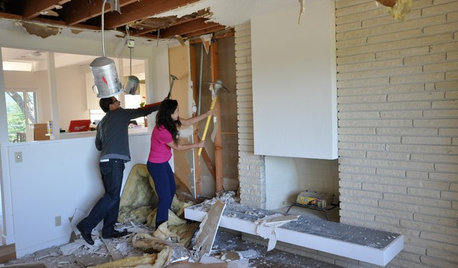micromanaging clients
Florabunga
17 years ago
Related Stories

WORKING WITH PROS10 Questions to Ask Potential Contractors
Ensure the right fit by interviewing general contractors about topics that go beyond the basics
Full Story
REMODELING GUIDESSo You Want to Build: 7 Steps to Creating a New Home
Get the house you envision — and even enjoy the process — by following this architect's guide to building a new home
Full Story
MOST POPULAR11 Things to Expect With Your Remodel
Prepare yourself. Knowing what lies ahead during renovations can save your nerves and smooth the process
Full Story
REMODELING GUIDESShould You Stay or Should You Go for a Remodel? 10 Points to Ponder
Consider these renovation realities to help you decide whether to budget for temporary housing
Full Story
LANDSCAPE DESIGNHow to Find and Hire a Great Landscape Contractor
Get your landscape project built on time and on budget by hiring a quality professional
Full Story
FEEL-GOOD HOME8 Tips for Harmony in the Kitchen
Frustrated by the arguments that arise over kitchen duties? Check out these coping strategies
Full Story
REMODELING GUIDESWisdom to Help Your Relationship Survive a Remodel
Spend less time patching up partnerships and more time spackling and sanding with this insight from a Houzz remodeling survey
Full Story
CONTRACTOR TIPSBuilding Permits: The Inspection Process
In Part 5 of our series on home building permits, we explore typical inspection schedules for a variety of project types
Full Story
DOORS10 Ways to Work Screen Doors, Inside and Out
Take this functional feature up a notch with one of the many alternative door styles available
Full Story





swanoir
inkognito
Related Professionals
Norfolk Landscape Architects & Landscape Designers · Beachwood Landscape Architects & Landscape Designers · Fitchburg Landscape Architects & Landscape Designers · Kapaa Landscape Architects & Landscape Designers · Leawood Landscape Architects & Landscape Designers · Zion Landscape Architects & Landscape Designers · East Patchogue Landscape Architects & Landscape Designers · Arden-Arcade Landscape Contractors · Brunswick Landscape Contractors · Davis Landscape Contractors · Deerfield Landscape Contractors · Metairie Landscape Contractors · Raleigh Landscape Contractors · Roseville Landscape Contractors · Vallejo Landscape Contractorstegwyn
jumpinjuniper
FlorabungaOriginal Author
nicethyme
Embothrium
watergal
FlorabungaOriginal Author
laag